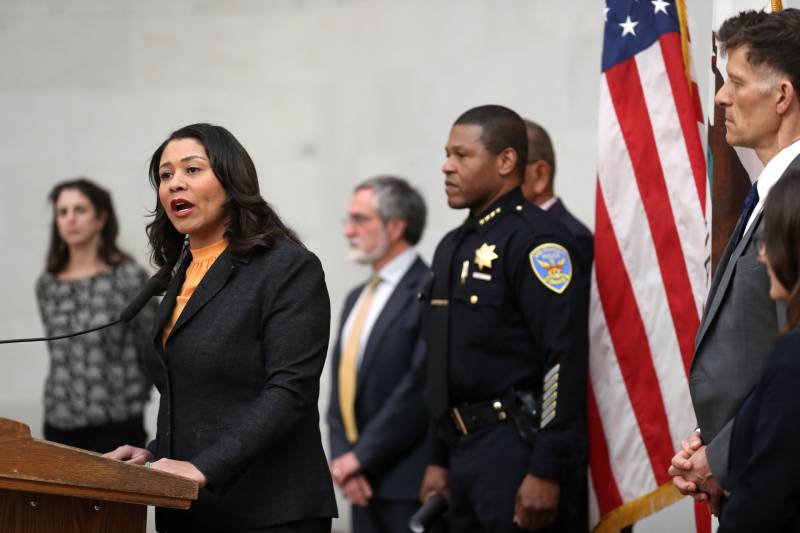Police have used the cameras to make several arrests, including a sexual assault suspect by San José police whose car was identified by ALPR cameras in San Francisco last week. They also arrested a woman who had a warrant after a camera identified her car.
“These 100 cameras have been a massive help to our police department,” Police Chief William Scott said in a statement on Monday. “In just a few weeks, we’ve received thousands of hits on stolen or wanted vehicles.”
Crime is down in San Francisco this year. There were 13% fewer violent crimes and 33% fewer property crimes from January through May compared with the same period last year, according to a Wednesday statement from the mayor’s office. Violent and property crimes are also down in all regions of the U.S. in the first three months of the year, according to data released by the FBI on Monday.
When asked about this, Breed maintained that the increased police response in the city is having an effect.
“The numbers — in terms of an over 85% arrest rate for homicides — that’s not happening in other cities around the country,” Breed said. “That is directly attributed to a lot of the work that we’re doing to increase our capacity to make arrests.”
Privacy concerns about mass surveillance
The technology is “eroding our civil liberties and our privacy,” Saira Hussain, senior staff attorney for the San Francisco-based Electronic Frontier Foundation, told KQED.
“When you have a network of hundreds of cameras around a densely populated city, you’re going to inevitably start to understand patterns of how somebody’s moving about and being able to track their movements at a very granular level,” Hussain said. “It starts to look like a mass surveillance technology that is basically a dragnet, and it is identifying everybody who is driving around — not the very, very small percentage of people who may be engaged in criminal activity.”
In response to a question about privacy, Breed said, “We are using what we have at our disposal to help us combat issues around crime. And sometimes there are trade-offs if we want to make sure that we are using this technology in a way that’s going to help make our streets safer.”
Hussain said she wants San Francisco police to share the data on how the technology has been used and what the outcomes have been.
“We should not just merely say, ‘Well, the technology exists, so we should just use it.’ I’d also again posit back on the police department. I want to see what the stats are,” Hussain said. “The studies that are out there have shown that actually automated license plate readers do not have a discernible effect on solving crime.”
A city ordinance requires San Francisco police to disclose an annual report on using ALPRs. Hussain and her colleagues submitted requests for public records for these reports, which the police could not produce. The city’s Sunshine Ordinance Task Force ruled last year that police were in violation of that ordinance (PDF).
The automated license plate readers, or ALPRs, are just one part of a broader shift toward using new surveillance technologies for policing in San Francisco.
